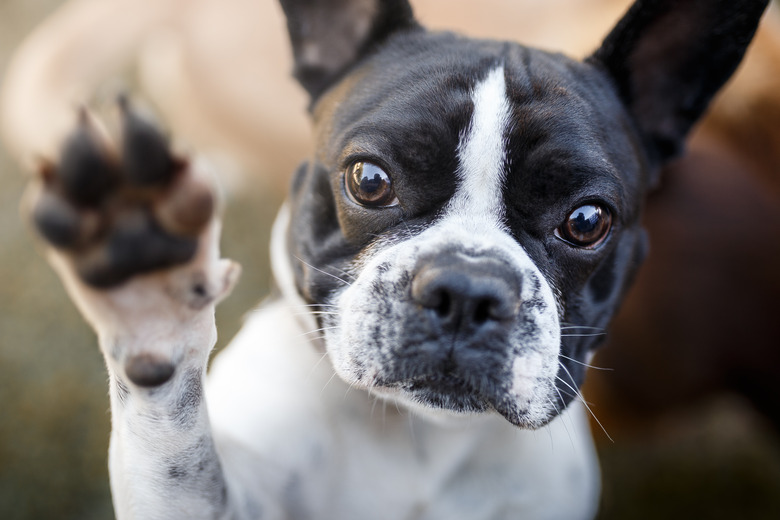Why Does My Dog Always Give Me His Paw?
Your dog's regular bark lets you know someone is at the door. Other types of vocalizations have different meanings, and you soon learn to distinguish between them. Canines communicate with their people in many ways, and the pawing routine is pretty common. Dogs paw for various reasons, but he can't tell you exactly why he's doing it.
Observe your dog carefully. Often, it's not that hard to figure out why he's pawing, but don't just make assumptions. By observing your dog's body language, you can figure out if he's feeling OK or if something is wrong. There's always the chance that he's trying to tell you the equivalent of Timmy falling down the well.
Demanding attention
Demanding attention
It's likely the primary reason your dog is constantly pawing you is because he wants attention. Since you pay attention to him once he paws you, as far as he's concerned, it works. Think of a child constantly whining to get a parent's attention — it's much the same strategy. Your dog wants your attention and he wants it now.
Hungry puppies
Hungry puppies
When mealtime approaches, especially if you don't seem cognizant of the hour, your dog may let you know there's a starving animal in the house by pawing. If it is his dinner time, that's one thing, but don't let your dog get into the habit of pawing you and receiving something to eat in return every time he does it. Even if it is time for dinner, train him to wait patiently — or as patiently as possible — for you to prepare and serve it.
There's nothing wrong with giving your dog a daily treat or two, but if he sees you as a constant treat dispenser, you may have created a canine monster. Dogs have no concept of a healthy diet or the dangers of obesity. As The Dog Clinic notes, the dog should not serve as the party deciding when he gets fed.
Stressed dogs
Stressed dogs
Does your dog have a nervous, highly strung temperament? Constant pawing and begging for your attention may indicate stress. Of course, even mellow dogs experience stress sometimes, especially if something out of the ordinary occurred. Where there loud noises or raised voices in the household? Have there been any major changes, such a new person or pet in residence?
Even though you want to comfort your dog if he's anxious, you don't want to encourage his pawing. If your first instinct is to baby him, don't do it. That tells him he wasn't wrong to worry. Instead, take him for a walk, have him practice some basic training such as sit and stay, or otherwise distract him.
The dominance theory
The dominance theory
Is your dog pawing you because she wants to show you who the boss is? The dominance theory of dog training would have you believe that's the reason behind the pawing, but that line of thinking has been largely debunked, according to the RSPCA. The dominance theory relied on the observance of captive wolf packs, with alpha wolves heading the social structure. However, studies of natural wolf packs show that this is not the way wolves behave in the wild, where jockeying for dominance rarely occurs.
Stopping dog pawing
Stopping dog pawing
Constant pawing is an annoying habit, but it's possible to stop. Start by not rewarding her by giving her attention. Vetstreet recommends "freezing like a statute" and not making eye contact for up to 30 seconds. Your dog is likely to accelerate her bid for attention at first. However, consistently ignoring her attention-getting pawing, and only giving her attention when her feet are on the ground should allow her to make the connection eventually.
An alternative is teaching your pet to "shake" a paw. Use the word "shake" when he gives a paw, and reward him only when you give the cue. He will have to actually think about his actions, rather than just paw you all the time.
